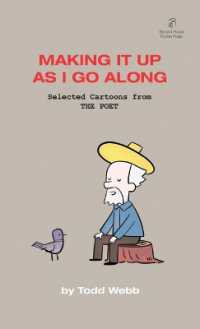- ホーム
- > 洋書
- > 英文書
- > Philosophy
Full Description
Several myths about Plato's work are decisively challenged by Catherine Rowett: the idea that Plato agreed with Socrates about the need for a definition of what we know; the idea that he set out to define justice in the Republic; the idea that knowledge is a kind of true belief, or that Plato ever thought that it might be something like that; the idea that "knowledge proper" is propositional, and that the Theaetetus was Plato's best attempt to define knowledge as a species of belief, and that it only failed due to his incompetence.
Instead Rowett argues that Plato was replacing the failed methods of Socrates, including his attempt to find a definition or single common factor, and that he replaced those methods with methods derived from geometry, including methods that involve inference from shadows to their originals (a method which Rowett calls "the iconic method"). As a result we should see that Plato is presenting the knowledge that is acquired as non-propositional and pictorial in nature, and that it is to be identified not with knowledge of facts nor of objects, but of types qua types-types that stand to the tokens that are used in our enquiry as original to shadow. The book includes detailed studies of the Meno, Republic and Theaetetus, and argues that the insights that Plato brings about the nature of conceptual knowledge, its importance in underpinning all other activities, and about the notion of truth as it applies to conceptual competence, are significant and should be taken seriously as a corrective to areas in which current analytic philosophy has lost its way.
Contents
Part One: Knowledge, Truth and Belief
1: Knowledge, Conceptual knowledge and the Iconic Route to Grasping an Idea
2: Truth and belief
Part Two: Plato's Meno
3: Introduction and summary for Part Two: Plato's Meno
4: Knowing what virtue is in Plato's Meno
5: Knowledge and correct impressions in Plato's Meno
Part Three: Plato's Republic
6: Introduction and summary for Part Three: Plato's Republic
7: Discovering what justice is, in Plato's Republic
8: Platonic method: the philosopher's route to knowledge in Plato's Republic
Part Four: Plato's Theaetetus
9: Introduction and summary for Part 4: Plato's Theaetetus
10: Geometry and the Scientific Project: Theaetetus 142a-184b
11: The division between Sense Perception and non-sensory Doxa in the Interlude: Theaetetus 184a to 187b
12: On the failure of the remaining two attempts to analyse episteme: Theaetetus 187b to 210a
Part Five: The Bigger Picture
13: Conclusions and further tasks





